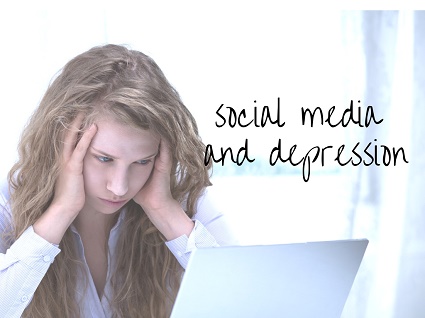Social media and depression are contradictory, right? Even the phrase “social media” sounds like a whole lot of fun, and just saying it out loud conjures a whirlwind of delight. Social media lets you stay constantly connected with 1,000 of your closest friends, it gives you a glimpse into the lives of strangers, and allows you to stalk and send messages to celebrities in a way that is deemed appropriate by society. Social media is a non-stop, 24/7 party in your pocket! What’s not to love?
Just take a quick look on Facebook, or Twitter, or Instagram, or whatever. Unless they are complaining, every single person is ecstatic and doing something awesome and amazing. This is empirical evidence that social media is a golden boxcar of joy on the direct line to bliss town.
Or not.
Research at the University of Pittsburgh found that heavy social media use actually correlated with depression. Those who used social media more often were more than twice as likely to show strong markers for depression than those who spent less time on Facebook, Twitter, and the Like.
While this is the first large-scale study of its kind, it doesn’t, as the researchers’ statement put it, “disentangle” cause and effect. It is possible that people who spend over an hour a day stalking someone on Facebook are depressed in the first place, and are obsessively checking in at their social media accounts in response to their moods.
However, researchers had some speculations about why social media might make people unhappy.
What connection could there be between social media and depression?
- People tend to present their lives in idealized ways. They post photos of themselves and their friends on cruises. They don’t post photos of themselves in sweatpants, bickering with their roommates. This is probably a good thing. However, it can give visitors a false impression that everyone else is out there having fun all the time, leading to unfavorable comparisons with their own uncurated lives.
- People may feel that the time they spend on social media is unproductive (which could be true) and feel bad about wasting that time. If they also feel that they can’t stop themselves from looking at their friends’ Instagram accounts dozens of times a day, they may be displaying Internet addiction, which has been associated with depression.
- More time on social media can also mean more exposure to cyber bullying or unpleasant interactions. While we potentially have a lot of control over what we see on social media, many people don’t know how to tailor their social media streams to avoid being hit with angry political debates or heartrending news announcements. Not to mention hurtful comments, and there’s no setting that lets you avoid those.
Other studies have pointed to fear of missing out, or the possibility of allowing social media to sub for real life and lead to isolation. One of the most compelling findings has been that Facebook tends to arouse feelings of envy, which leads to less satisfaction with life.
At the same time, there are also community websites which provide support for people with depression — a positive connection between social media and depression. And social media data can be used to identify potential mental health concerns, too.
What does this mean for social media marketing?
We’re not here to tell you how to use social media in your personal life. But is it possible that the use of social media for marketing can have negative consequences for your customers’ mental health?
There has been quite a bit of research on social media and depression, but no studies have shown any connection between social media ads and depression. Even those ads that show people demonstrating a completely implausible level of joy because they drank a sugary drink don’t seem to lead to depression.
In fact, studies generally have found that it is the amount of time people spend using social media or their personal interactions, not the type of content they consume, that shows the correlation with depression.
If you want to be sure to be a force for good and not evil in social media, why not curate content that makes people feel good about their lives? Uplifting images and positive news can bring cheer to your followers — without inspiring unhealthy envy.


Leave a Reply